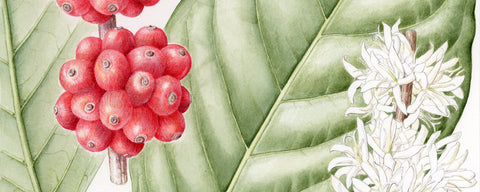First Published - September 29, 2017 (By Pascale - Coffee Lover, Traveller and Mother)
I’ve been reading a book set in the late 2050s. In it, the future of food supply is pretty bleak. People have more or less stopped eating meat. Soy dogs and veggie hash are the norm. And the worst part…real coffee is only available for the rich and the famous. The rest of the world now drinks ‘surrogate’ coffee.
What if I told you this book is non-fiction? That this really could be what the future looks like? And that scientific research has revealed that, by 2050, half of the current coffee growing areas of the world will no longer be suitable for coffee growing. Mainly because of higher temperatures and less rain.
The issue around climate change and crop diversity is a global one and of course goes far beyond coffee. Population growth estimates suggest that within the next 25 years the global population will increase to 10 billion. And those 10 billion people will all need feeding. To add to this scientists have estimated that with every 1 degree increase in temperature there will be a 2% lower agricultural yield. Supply is a serious concern.
Plants do of course adapt. But the temperature increases predicted are just too fast for coffee plants to adapt in time. The dry season will become more and more prolonged. Meaning any new varietials need to be resistant to high temperatures, drought and leaf rust!
We simply can’t afford to assume this is all the work of fiction then.
Climate change and its consequences are a huge challenge for coffee growers. A challenge too big for any single roaster to tackle alone. No, an issue of this severity requires pooling resources and knowledge within the industry as a whole. To give some sense of scale to that task, did you know that coffee is one of the most under-innovated crops in the world? There is less breeding innovation in coffee than there is in watermelons! So unless we all fancy switching to watermelon juice every morning, we have a shared responsibility to affect change. And quickly.
Fortunately it’s not too late. World Coffee Research is an organisation that works globally and collectively. It’s mission is to grow, protect, and enhance supplies of quality coffee while improving the livelihoods of the families who produce it.
Our relationship with World Coffee Research (WCR) dates back to its inception in 2010 . We’ve worked closely with them ever since. Our founder, Steven, sat on the board on the board of Directors from 2012-2014. And during my time as the Sustainable Relationship Manager at Union Coffee I’ve worked with WCR as a Research Associate to set up a system in Guatemala to monitor socio-economic data and the profitability of coffee in Guatemala (2014/2015).
We also support them with an annual contribution. This donation goes into research and development which supports the future of coffee, in 26 countries.
World Coffee Research’s research focusses on:
- Coffee genetics and breeding
- Coffee quality
- Coffee varieties
- Climate change
- Supporting farmers profitability
- Coffee disease and pest
Put simply, climate change will put more pressure on farmers: Lower yields and poor coffee quality (caused by increased pests and disease) will result in lower farmer income and reduce their ability to make a living. We choose to support WCR, precisely because their research and innovation focusses on solutions that address these issues and, as a result, have a direct and positive impact on coffee farmers.
The importance of WCR’s research cannot be underestimated. In their International Multi location Variety Trial: the world’s largest coffee seed exchange, they made a very important and exciting discovery. They planted 30 varietials from 20 countries in Laos, in an area where the plants were subjected to temperatures as low as 2 degrees Celsius. Seven of the varietals survived the cold snap. They’re now being taken to other coffee regions, from Brazil to Guatemala, to see if they can thrive in foreign soils and uncontrolled conditions. Eventually, the coffee plants deemed most resistant to both colder temperatures and leaf-rust will be selected for planting.
We have introduced many of our farmer partners to WCR, and we’re currently looking into a potential collaboration for the international multi location variety trail. Very exciting stuff!
World Coffee Research have also created the first ever coffee varietal catalogue for central America. This is an important tool for farmers, especially considering that the life of a coffee tree is 20-30 years. A poor choice of varietal can cause huge cumulative losses for farmers. During the project, they realised there was another issue: The coffee sector had limited certified seed production. There is a risk that farmers buy seeds which don’t conform to quality, genetic purity and varietal standards. Fraudulent seed purchases, can result in farmers producing lower yields, or lesser quality than they had anticipated. To tackle the problem, WCR started a coffee nursery certification programme. This programme gives farmers access to certified seeds.
These are just a couple of examples of the work of WCR does on breeding. Verifying is focussed not only on productivity and disease resistance but also on quality. We believe that Speciality coffee in particular then, is an important strategy for farmers to obtain better profitability on their farms.
I can’t imagine a world without coffee. I doubt you can either? If you read this blog, you likely share a similar passion for coffee as everyone here at Union. We all need our daily shot of caffeine (especially in the morning). Yet, more importantly, around 125 million people worldwide depend on coffee for their livelihoods!
If you didn’t know Sunday 1st October 2017 is International Coffee Day. To mark the occasion we’re dedicating this post and our efforts this year to highlight the important work World Coffee Research are doing.
Keep up the good work guys! With such a serious issue facing us it’s essential that dedicated people like you are making a positive impact on coffee farmers lives!…And, hopefully, all our futures.
If you’d like to learn more about WCR’s work, click here. And if you’d to help us spread the message make sure you add #futureofcoffee to all your coffee posts and tweets.









